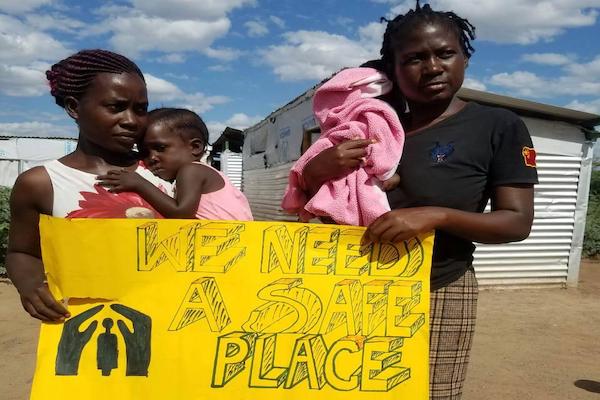Content warning: This story contains descriptions of trauma that may be disturbing to readers.
You have come to the world’s largest refugee camp with your beautiful baby, Patricia. You are escaping horrific persecution for your sexuality by your community and family. The camp is impoverished and desolate and you must build your shelter with plastic, mud, and wood. Food is scarce. Patricia has health concerns, but when they discover you are gay, your baby is denied medical treatment.
One day as you are walking, a local man throws tear gas at you. Your throat and eyes burn, your skin aches. Your baby screams in pain. She coughs, crying in agony, and finally she passes away. She dies because of hate. You want justice, but the police do nothing because they share this assailant’s hatred for you. Your baby is gone. There is an emptiness where her beautiful life once shone a light, and you must move on, try to survive.
This is the experience of Kyazike Regina, a 27-year-old lesbian refugee in Kakuma.
Sadly, her story is not unique.
In the far northwest corner of Kenya sits the town of Kakuma. The camp there, supported by an organization called UNHCR, houses about 200,000 refugees. It is a poor, crowded place with minimal resources. For the LGBTQIA+ people of Kakuma, life is hell. It is not only a crime to be LGBTQIA+ in this area, these human beings are viewed as “devils” and are therefore completely shunned, even by other refugees, employers, doctors, and the police. This community is often subject to violent attacks, many of which have resulted in serious injury, including a child who was scalded with hot water for playing with a neighbor’s children (per the Bay Area Reporter). They are being beaten, raped, tortured, and even killed for their identities and who they love.
Hanifa, 18, and her younger sister came to Kakuma from Uganda in early 2022. Hanifa was escaping horrible abuse from her stepfather and persecution for her sexuality. She and her sister overcame overwhelming odds, including police searches and a near death experience, just to reach Kakuma. Now that they are there she tells me, “Kakuma is a very bad place. It’s like hell. We are being discriminated, raped, and not being helped by either UNHCR or the police. When it comes to we girls, we don’t have access to medication. We don’t have sanitary wares, nothing.”
Meddie, 22, says, “When I was eighteen, my father chased me with a panga knife trying to cut me, asking ‘why are you gay?’. … Ever since I was brought to Kakuma, life has been difficult. I have been assaulted, beaten, tear gassed… We once went to UNHCR to seek help. We slept on the steps for three nights, but they called police who tear gassed us. One lesbian mother, Rebekah and her four-day-old baby were gassed too… My future has been buried in Kakuma. I had dreams of completing my education, but all in vain. I just wish that I could get to a safe place.”
Neva, a lesbian in the camp, says in a social media video, “We receive discrimination at hospitals. Once they know you are a lesbian, they discriminate…. We cannot buy at a shop. … They see us as evil people, as an abomination. We cannot go to church and pray. They tell us, ‘God does not love you.’”
Katz, another lesbian and single mother shares, “Whenever they meet you, they want to undress you. They want to rape you… So many have been raped, including me. As a result they are getting babies. Others are getting HIV… When you report, no investigation is undertaken… They say ‘we don’t want you’ and they chase you away.”
The LGBTQIA+ people of Kakuma are suffering needlessly, and are in desperate need of help, but despite all of their tribulations and pain, they are still loving, generous people who support each other, nurse each other, and take the time to show kindness and affection to everyone in their lives. They prove that love is indomitable every day.
Please, raise your voice for them. Donate towards their food, shelter, and medical needs here.


